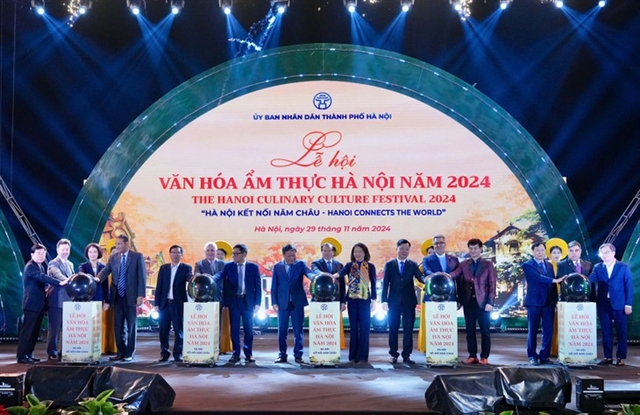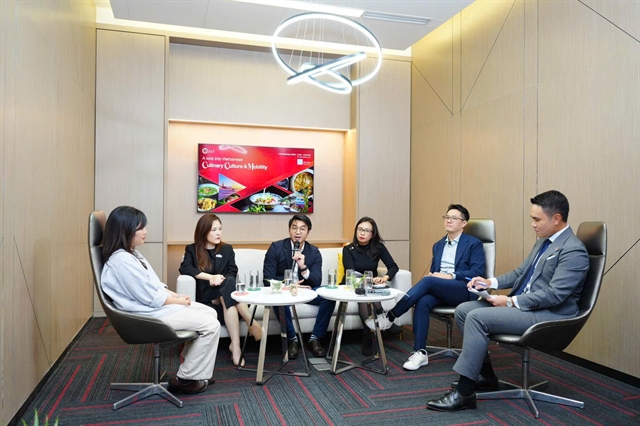 Life & Style
Life & Style

 |
| Participants attend a meeting, entitled C asean Vietnam Group Sharing 2024: A Look on Culinary Culture and Mobility in Việt Nam in Hà Nội on December 18. — Photo courtesy of the organiser |
HÀ NỘI — Networking organisation C asean Vietnam successfully organised a roundtable discussion about ' A Look on Culinary Culture and Mobility in Việt Nam' in Hà Nội on December 18.
The event brought together experts from diverse fields, including world-renowned food rating systems, restaurant alliances, mobility service providers, chefs and the founders of restaurants.
As Vietnamese cuisine continues to gain global recognition and solidify its position on the world map, the event focused discussion on opportunities to elevate Vietnamese culinary culture, while leveraging modern mobility and tourism trends to promote it internationally.
Speaking at the event, the Chairman of the Restaurant Association of Vietnam (RAV) and ASEAN Restaurant Association Alliance (ARAA) Chu Hồng Minh said that RAV’s strategy has focused on three pillars: resource development and collaborations, communications and gastronomic economy with the vision of positioning Việt Nam as a 'New Culinary Capital of the World' by 2030.
As the Chair of ARAA for 2024–2025, Việt Nam's initiatives will spotlight key projects: Culinary competitions, trade within ASEAN and globally, productivity training programs for small and medium-sized restaurants and culinary tourism within ASEAN.
In addition, Việt Nam will also boost strategic collaborations with international organisations, such as the World Association of Master Chefs (WAMC), the National Restaurant Association (NRA) in the US, and the World Food Travel Association (WFTA).
Managing Director of Michelin Vietnam, Ahmad Faiez Mohamed Pisal, shared the company's 130-year history of innovations. To achieve net-zero emissions by 2050, Michelin has adopted the 'All Sustainable' strategy, balancing the three key pillars of people, business performance and the planet.
In 2020, the Michelin Green Star was introduced to recognise dining establishments pioneering sustainable gastronomy, delivering experiences that combine culinary excellence with serious environmental commitments.
Speaking about the Green Star Award, Pisal emphasised its profound significance in raising awareness and embedding sustainability-driven business philosophies into the operations of the food service industry, fostering a stronger connection between behaviour and environmental consciousness.
Head of Public Affairs at Grab Vietnam, Đặng Thùy Trang, discussed consumer trends of using online platforms to discover new dining experiences.
Leveraging real-time analytics and platform tools to optimise accessibility and visibility for restaurant partners, Grab enhances user experiences and contributes to preserving and advancing Việt Nam’s culinary richness. Grab Vietnam has also collaborated with local tourism authorities to further introduce dining opportunities to both Grab users and travellers, supporting Việt Nam's culinary diversity, according to Trang.
Founder and Executive Chef of Nén Danang & Nén Light, Summer Lê, highlighted her restaurant's sustainable initiatives, including utilising traditional ingredients, fostering talent development and preserving the essence of traditional Vietnamese cuisine through meaningful storytelling behind every dish.
As the first Vietnamese restaurant awarded a Michelin Green Star, she considered this accolade a responsibility to promote sustainability awareness. She emphasised that achieving sustainable culinary operations is feasible, even in large urban areas.
Co-founder and Head Chef of Gia Restaurant Sam Trần, emphasised the importance of a people-centred business philosophy, which she credits to Gia’s Michelin Star recognition. She highlighted continuous learning and teamwork as crucial to delivering exceptional dining experiences.
Gia embraces a 'fearless of change' approach, reflected in its regularly updated menu, ensuring diverse experiences for diners. As an expert in traditional Vietnamese cuisine, she regards herself as a cultural ambassador for Việt Nam.
The discussion illuminated the close relationship between culinary culture and mobility, demonstrating the immense potential to promote and develop Vietnamese cuisine globally. It also showcased the creativity and innovation of Việt Nam’s culinary community within an increasingly internationalised landscape.
This event is part of C asean Vietnam’s series of sessions to foster the development and connectivity of ASEAN communities through in-depth exchanges on culture, arts, talent development and sustainable business practices. — VNS




